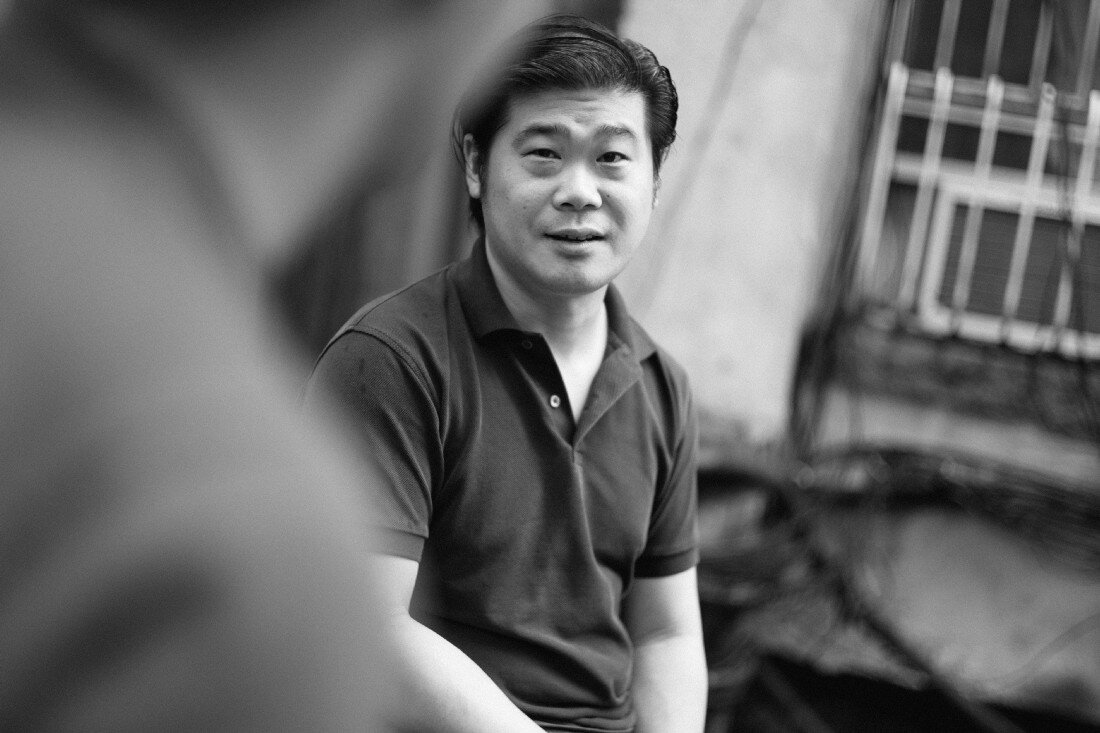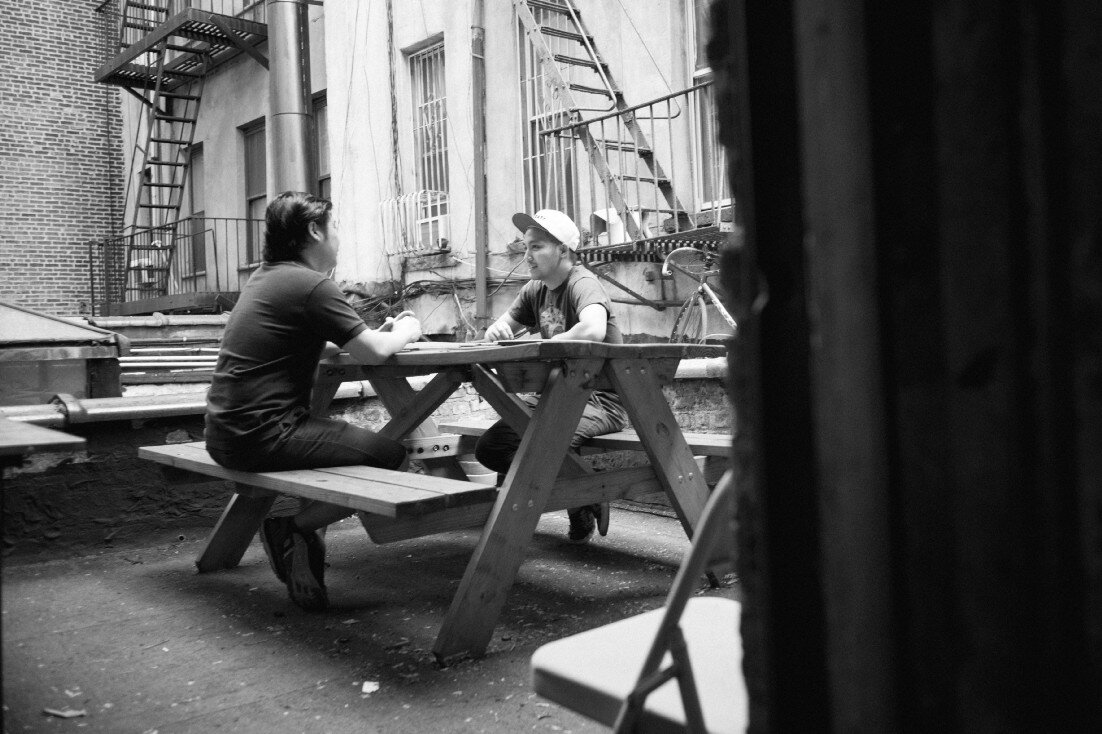Gary Chou helps students rise to the challenge.
What the co-teacher of SVA IxD’s Entrepreneurial Design learned from his five years helping students launch $1,000 ideas.
My friend Gary Chou approaches facilitation as a self-described game show host — designing challenges, monitoring airtime, and keeping things moving.
Operating out of Orbital, the studio he founded in the Lower East Side, Gary co-teaches a unique course called Entrepreneurial Design with Christina Xu at School of Visual Arts MFA in Interaction Design. In the semester-long class, students are challenged to make $1,000 by launching an original idea. “Rather than teach students to be entrepreneurs, the course aims to teach them to be entrepreneurial in their pursuits.”
Since meeting Gary, I’ve been eager to absorb his wisdom. He’s got a lot of it. Gary and I spent an hour on the patio at Orbital (I’m a member!) digging into how to craft a challenge and the importance of networks.
Here are the highlights from our chat, adapted for written text. You can also hear it from Gary himself here:
Pardon the wind noise. It was a beautiful day, and we had to be outside. :)
Kevin Huynh: I feel you play this role of host or facilitator a lot. What has been the evolution of that in your life?
Gary Chou: Before I moved to New York, I did that more socially, less so professionally. I’d host concerts in my living room with friends, many of whom are audio gear-heads. We’d livestream concerts, people would bring food, and it would be a really fun event. I had an apartment on the top floor of a commercial building. Since it was the only residential unit, we could make whatever noise we wanted to.
Then I moved to New York in 2010 and joined Union Square Ventures. My role was to facilitate a network amongst the people who worked in the portfolio companies that didn’t necessarily have any reason to trust each other outside of the fact they took money from the same investor. I needed to be intentional about how to allow for them to interact and engage. In that case, I was playing host.
What I learned over time is that I was doing design except I was working within the medium of spaces and bodies rather than bits and pixels. In a lot of ways, running these programs has made me a better designer because when you’re working in the digital world, you’re so far removed from feedback. What you get is data in a log file somewhere.
I was doing design except I was working within the medium of spaces and bodies rather than bits and pixels.
KH: Yeah, you get to see footprints.
GC: It’s very easy to lull yourself into thinking that the thing that you’ve designed is working exactly the way that you thought it should because the data that you’re measuring is coming back positive. But when you run a program in a physical space, if it’s not truly working for everyone, it’s incredibly obvious. So the stakes are actually higher. It’s harder to design programs that are in person.
KH: Tell me about your “game show” framework. It’s something you talk about a lot, and I love it.
GC: Over time, I have learned that you want to think of everything as a game show. In a game show, there’s a finite period of time, and there are segments. Each segment is designed for a certain type of behavior and interaction.
Are we creating a program where I’m just getting up and talking at a bunch of people? Or are we creating an environment where people are engaging with each other? Are you engineering ways for every single person around the table to be required to speak? And also to listen?
KH: So you’ve been teaching this Entrepreneurial Design course for a few years. What have you learned from these students and their $1000 Projects?
GC: You’ve probably heard me talk a lot about how success for creators is a function of whether or not they have access to the networks that they need. That is such a simple, straightforward concept, but I don’t think I really landed on that being a worthwhile thing to talk about until 2015.
Success for creators is a function of whether or not they have access to the networks that they need.
KH: So you came to this conclusion about the importance of networks. You started thinking, “Well, if success for these creators depends on the networks they’ve built, how do we help them cultivate this network?”
GC: Exactly. And then I f*cked up.
KH: How’d you f*ck up?
GC: For the longest time I’d been trying to kill the $1000 Project because I thought that all it did was get people to focus on money rather than on networks. If access to networks is so important, we should be teaching people to build networks. So, we created an assignment that literally was, “Hey, go build a network!”
Datrianna Meeks’ project: What Would Beyoncé Say (class of 2016)
What happened was the whole class struggled with it because it’s effectively the equivalent of saying to a comedian: “Tell me a funny joke.” It was in this that I started to understand, “Oh, the network that you create is the byproduct of a thing that you do, it’s not the thing that you make.”
How do friendships form? How do relationships form? They form through a common experience of some act. You don’t go to someone and say, “We will be in relationship together,” right?
KH: “You and me — destined for friendship!”
GC: Yeah. That just doesn’t work.
That’s when I learned to actually appreciate the magic of the $1000 Project. The $1000 Project was really great because everyone has an idea of how they could make $1000. It’s a very accessible challenge. Because of that, you can get moving.
It’s not about teaching people how to run a race with perfect form. It’s about getting them to start running, and then pointing them in a direction that would be relevant for them.
It’s not about teaching people how to run a race with perfect form. It’s about getting them to start running, and then pointing them in a direction that would be relevant for them.
KH: And I imagine the students start to trust each other and form their own networks.
GC: Yeah. There are all these little nuggets: someone designed a logo for someone else’s project; someone helped someone else with their accountability or someone helped them with their writing.
By the time we review what they’ve learned in the course retrospective at the end of the semester, they start to piece it together, “Oh yeah, I actually needed this person’s help to prototype,” “They were my end user,” or “They were in the photo that I used for my project.”
This is the whole point: creating things is a multiplayer game. The moment you deny that you’re going to have a really, really tough time.
Guri Venstad’s project: The Cheese Map (class of 2013)
KH: If I was starting a new program to help people do something outside their comfort zone what drops of knowledge would you share with me?
GC: My friend Karin Chien, is an indie film producer and she has this philosophy of producing: it’s not just important to think about the stories that you want to tell, but who you want to tell them for, and who you want to tell them with. You want to be intentional about all of those things.
I found that to be very true across a lot of the different work that I do. If you’re not intentional about who you’re really doing this for and with, things can get very foggy along the way.
KH: Why do you do this stuff?
GC: As a teacher, you can’t do your student’s work for them. You can’t be like “Hey, move aside, little Joey. Let me show you how you this is really done.”
Creating things is a multiplayer game.
There’s a joy in that because what gets produced is often well beyond my capability. And that’s kind of neat.
For most of my career, I’ve worked on failed digital products for companies, sites, and services that are no longer alive on the internet. That’s kind of depressing.
But I’ve had the opportunity to teach. Whether they have come through Orbital, SVA or our other programs — seeing that you’ve helped change the angle of direction someone is moving in by one or two degrees, that taken over a long period of time is pretty powerful.
KH: Thank you Gary. I appreciate your time.
GC: Thanks man.
Gary shows us what it takes to shift perspective
The story of the $1000 project resonates with me because I started my career in much the same way. I created a Kickstarter to raise $1000 for a social art project to distribute hundreds of disposable cameras around the world.
Nervous after hitting launch, I remember getting my first backers. It moved me to tears. Seeing my friends — my network — rally support made me want to put more things in the world to see what would come back.
Kevin: What’s that up there? Gary: A shoe.
Listening to Gary reflect on Entrepreneurial Design and the lessons gleaned from his other programs make me appreciate the careful, ongoing dissection of what students take away from each course. In the case of the $1000 Project, the money and creative output are only the tip of iceberg.
When he sets the stage and pulls the right levers, the game show host gives participants a chance to experience something that permanently shifts their perspective. And even a small change in direction, followed over a long period of time can lead to a drastically different destination.
You can listen to the my favorite soundbites from this interview with Gary on Soundcloud.
A jackpot of thank yous to Gary Chou for shooting the breeze and answering my questions. Check out these links to learn more about Orbital, Entrepreneurial Design and Communities of Practice. You can poke Gary on twitter @garychou.
This case study was produced by the team at People & Company.
We published a book, host a podcast, and we work with organizations like Nike, Porsche, Substack and Surfrider as strategy partners, bringing confidence to how they’re building communities.










